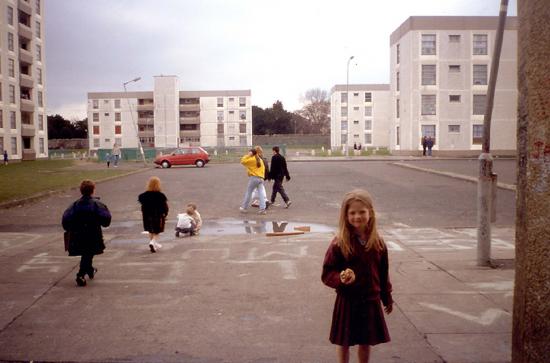
Homelessness, segregation and social injustice in Dublin and beyond will be among the topics discussed at an international conference in Maynooth University which opens to the public on Friday, 14 October.
Renowned researchers, planners, artists and activists from Ireland, New Zealand, USA, UK, South American and South African will meet in Dublin and Maynooth for the week long symposium on how regions of historical violence can come to terms with trauma and heal. Through workshops, talks, walks and arts, experts will address painful histories and social-ecological damage, and explore how to create a fairer future.
Highlights include a digital exhibition featuring Joe Lee’s historical and recent photographs of what was once Barracks Square, now St. Michael’s Estate in Dublin, images by Vukasin Nedeljkovic from his time in Direct Provision and Silivia Loeffler’s journal of residents’ memories of Dún Laoghaire Harbour.
The symposium, called Mapping Spectral Traces: The Place of the Wound, is being organised and curated by Dr Karen Till of Maynooth University Department of Geography. International guest speakers include Maori scholar and artist Dr Huhana Smith, Professor Mindy Fullilove of Colombia University & The New School and Peter Shirlow, University of Liverpool, Institute of Irish Studies.
Dr Till said each event will see Irish and international speakers exchange their knowledge and views on how to break the cycle of violence and social injustices here and around the world.
“The Irish and international guests participating in this symposium remind us that in order to break harmful cycles of injustice, we must first attend to the places of historical violence and understand how people become wounded. This is not easy. It raises what may seem to be insurmountable differences and unmanageable emotions. But when we learn how to take care of places, we create a common project together that invites us to think differently about the future and about each other.
“For example, rather than pretend that we have a clean slate in North Dublin for revitalisation, we should recognise how our past mindset - of making profits - created our current situation of unhealthy landscapes, with displaced and homeless families, few green spaces for children to play in, addiction and diet problems, and other social ills.”
Events include public lectures and talks about the intergenerational and health consequences of the serial displacement and segregation in cities in Ireland, Northern Ireland, South Africa and the US, the role of art in healing wounded bodies and places, music and arts, and a walk around Dublin’s north inner city exploring Ireland’s Decade of Centennaries. A conflict mediation and resolution workshop will be facilitated by practitioners from the Glencree Centre for Peace and Reconciliation and the Maynooth University Edward Kennedy Institute for Conflict Intervention.
Dr Till said research shows that memory work is needed to create communities and environments that nourish us:“This where the role of the socially and ecologically engaged artist is vital. They can join everyday citizens on a journey of listening and discovery, finding new ways of caring for our environments and imagining better ways of living,” she added.
The symposium is supported by the Irish Research Council New Foundations scheme.
All events are free and open to the public however registration is necessary - register here.
Note to Editors
About the international Mapping Spectral Traces network
Mapping Spectral Traces is a trans-disciplinary, international network of scholars, practitioners, community leaders, activists and artists who work with and in traumatized communities, contested lands and diverse environments. 'Mapping Spectral Traces VIII: The Place of the Wound' follows the network's ethos in exchanging ideas from those who come from different historical backgrounds and by engaging sensitively with particular cultural and political contexts, but also in the unexpected journey of exploring ideas and projects that emerge from international encounters and collaborations.
